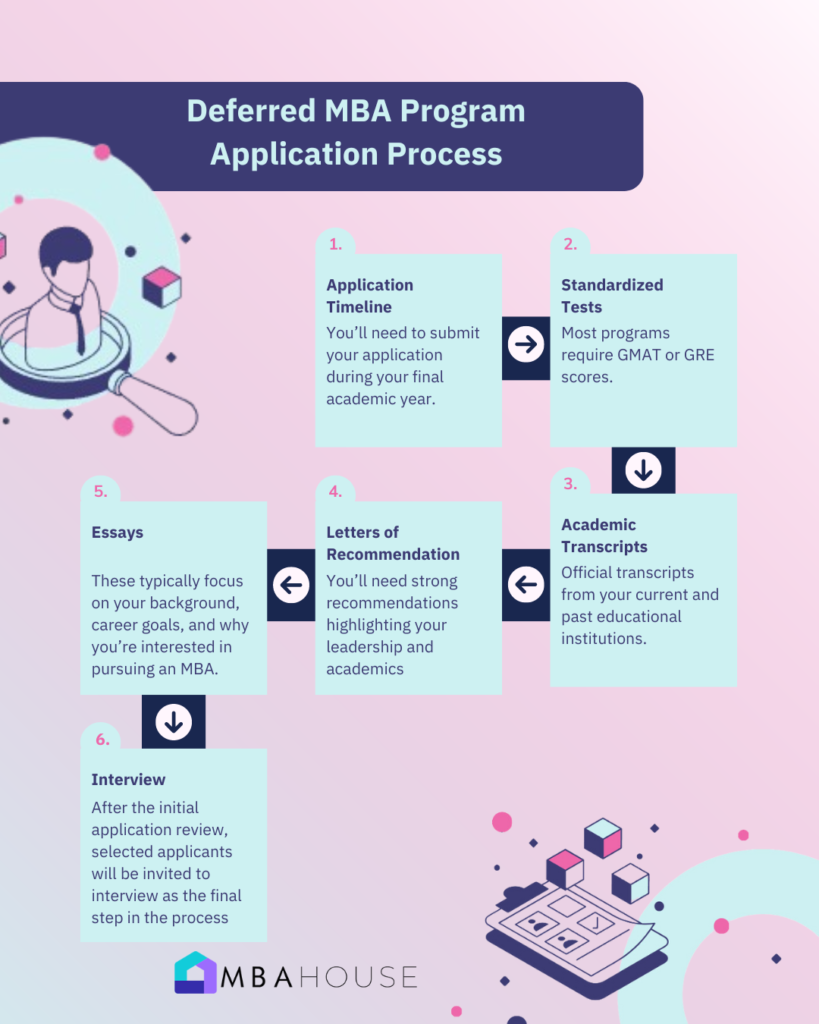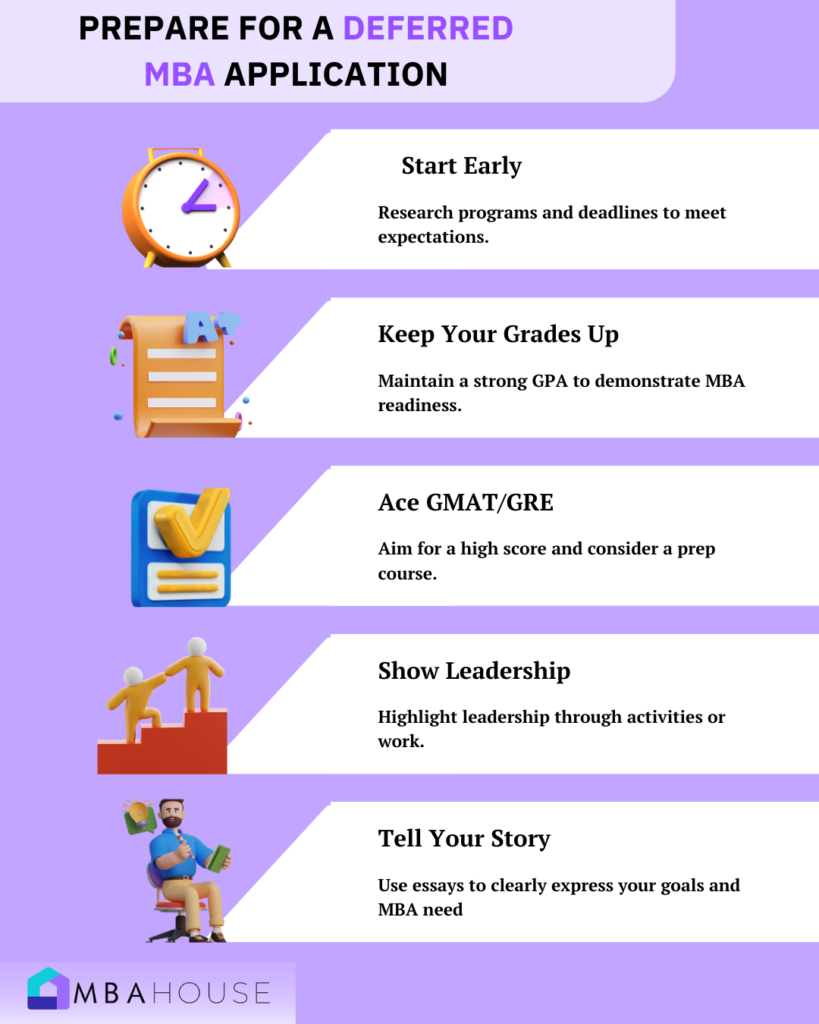If you’re in the final stretch of your undergraduate or master’s studies, you might already be dreaming big about your future career. You’ve got goals, ambitions, and a clear vision of where you want to be. But there’s this nagging thought: “How do I secure my place at a top business school without losing momentum in my career? The deferred MBA program is a golden opportunity that could be the perfect solution for someone like you.
So, what exactly is a deferred MBA program? Simply put, it’s just like a regular MBA, but with a key difference—you get accepted early, usually while you’re still in school. After that, you can focus on building your career for a couple of years before starting your MBA. This means you can dive into your job knowing that your future MBA spot is already set.
The significance of this option is huge. It lets you concentrate on your work without the stress of applying to business school later. Plus, when you’re ready to start your MBA, you can transition smoothly, knowing you’ve already been accepted.
Let’s know in detail.
Who Should Consider a Deferred MBA Program?
Deferred MBA programs are designed for early career candidates with little or no full-time work experience. Typically, applicants are in their final year of an undergraduate or master’s degree program. These programs seek students with a clear career path in mind and a strong academic track record coupled with demonstrated leadership potential.
Securing a spot in a prestigious deferred MBA program can provide several advantages:
- Early admission to your dream business school
- Flexibility to explore different career paths and industries before starting your MBA
- Opportunity to gain valuable work experience and clarity on your career goals
- Competitive edge in the job market with a top MBA credential
Have Questions About Deferred MBA Programs? Chat With Our Experts Now!
➡️ Message Us on WhatsApp!Top Schools Offering a Deferred MBA Program
If you’re considering a deferred MBA, here’s a list of top business schools that offer this unique opportunity:
- Yale Silver Scholars
- Harvard Business School: 2+2 Program
- Stanford GSB: Deferred Enrollment Program
- Indian School of Business
- UVA Darden: Future Year Scholars Program
- Penn Wharton: Advance Access Program
- Northwestern Kellogg: Future Leaders Program
- Chicago Booth: Scholars Deferred Program
- MIT Sloan: Early Admission MBA
- Columbia Business School: Deferred Enrollment Program
- Emory Goizueta MBA
- UC Berkeley Haas: Advance Access Program
Overview of the MBA Admissions Cycle
Whether you’re applying through traditional rounds or considering a deferred MBA, having a clear plan will help you maximize your chances of success. By understanding these key steps and planning your timeline carefully, you can navigate the MBA application process with confidence.
- Application Rounds: Most MBA programs have multiple rounds of applications, typically starting in September or October and running through March or April. Early decision rounds are offered by some schools, allowing you to apply and receive decisions sooner.
- Before You Apply: Preparing for your MBA application is a process that starts well before the deadlines. Begin by studying for the GRE or GMAT at least three months ahead of time to allow for a potential retake. This early start also gives you ample time to refine your essays, update your resume, budget for fees, and secure strong letters of recommendation.
- Application Strategy: Timing is key. For your top-choice schools, consider applying during the early decision or first round, when there are more available spots. For your safety schools, you might aim for later rounds, where your application might stand out more. Spacing out your applications can help you manage your time effectively and avoid the stress of submitting everything at once.
- Interview Preparation: Once you submit your application, the waiting game begins. Typically, interview invitations are sent out 3-4 weeks after the application deadline. Only a fraction of applicants—about 20-40%—will be invited to interview, so this is a crucial step. The interview is the final hurdle before decisions are released in mid to late
Remember, whether you’re applying for MBA deferred admission or a regular MBA, preparation is the key to success.
How to Apply for a Deferred MBA Program

When applying for a deferred MBA admission, the process is similar to that of a regular MBA, but with specific timelines and requirements tailored to students currently in their final year of undergraduate or graduate studies. Here’s a brief overview of what the application process typically involves:
- Application Timeline: You’ll need to submit your application during your final academic year, usually between October 1 and September 30. Keep in mind that deadlines can vary by program.
- Standardized Tests: Most programs require GMAT or GRE scores. However, some schools might waive this requirement for applicants from their own university.
- Academic Transcripts: Official transcripts from your current and past educational institutions.
- Letters of Recommendation: You’ll need strong recommendations, often from professors or professionals who can speak to your leadership potential and academic performance.
- Essays: These typically focus on your background, career goals, and why you’re interested in pursuing an MBA at this stage.
- Interview: After the initial application review, selected applicants will be invited to interview as the final step in the process.
It’s essential to research each deferred enrollment MBA program’s specific requirements and deadlines to ensure you’re well-prepared and meet all necessary criteria.
Start Your MBA Journey With Expert Guidance From Our Admissions Coaches.
Contact Us TodayDeferred MBA Programs Deadlines: 2024-2025 MBA
This chart outlines the deferred MBA application deadlines for a fall 2025 start for the M7 and top 25 business schools.
| School | Round 1 | Round 2 | Round 3 |
| Stanford GSB | Sep. 10, 2024 | Jan. 8, 2025 | Apr. 8, 2025 |
| Harvard Business School | Sep. 4, 2024 | Jan. 6, 2025 | No R3 |
| UPenn Wharton | Sep. 4, 2024 | Jan. 3, 2025 | Apr. 2, 2025 |
| Chicago Booth | Sep. 19, 2024 | Jan. 7, 2025 | Apr. 3, 2025 |
| Northwestern Kellogg | Sep. 11, 2024 | Jan. 8, 2025 | Apr. 2, 2025 |
| MIT Sloan | Sep. 30, 2024 | Jan. 14, 2025 | Apr. 7, 2025 |
| Columbia Business School | Sep. 10, 2024 | Jan. 7, 2025 | Apr. 1, 2025 |
| UC Berkeley Haas | Sep. 12, 2024 | Jan. 9, 2025 | Apr. 3, 2025 |
| Yale SOM | Sep. 10, 2024 | Jan. 7, 2025 | Apr. 8, 2025 |
| Dartmouth Tuck | Sep. 26, 2024 | Jan. 6, 2025 | Mar. 26, 2025 |
| NYU Stern | Sep. 16, 2024 | Oct. 16, 2024 | Jan. 16, 2025(R4: Apr. 16, 2025) |
| Duke Fuqua | Sep. 4 & Oct. 1, 2024 | Jan. 9, 2025 | Feb. 20, 2025(R4: Apr. 3, 2025) |
| Michigan Ross | Sep. 9, 2024 | Jan. 6, 2025 | Mar. 24, 2025 |
| UVA Darden | Sep. 5 & Oct. 2, 2024 | Jan. 7, 2025 | Apr. 2, 2025 |
| Cornell Johnson | Sep. 18, 2024 | Jan. 9, 2025 | Apr. 10, 2025 |
| *CMU Tepper | Oct. 2, 2023 | Jan. 8, 2024 | Mar. 4, 2024(R4: May 6, 2024) |
| *USC Marshall | Oct. 15, 2023 | Jan. 5, 2024 | Mar. 1, 2024(R4: Apr. 15, 2024) |
| UCLA Anderson | Oct. 1, 2024 | Jan. 6, 2025 | Apr. 7, 2025 |
| UT Austin McCombs | Oct. 15, 2024 | Jan. 15, 2025 | Apr. 1, 2025(R4: May 15, 2025) |
| UNC Kenan-Flagler | Oct. 16, 2024 | Jan. 8, 2025 | Mar. 4, 2025(R4: Apr. 29, 2025) |
| *Georgetown McDonough | Oct. 2, 2023 | Jan. 4, 2024 | Mar. 26, 2024(R4: Apr. 30, 2024) |
| UW Foster | Oct. 1, 2024 | Jan. 7, 2025 | Mar. 12, 2025 |
| Indiana University Kelley | Oct. 15, 2024 | Jan. 5, 2025 | Mar. 1, 2025(R4: Apr. 15, 2025) |
| *Vanderbilt Owen | Oct. 3, 2023 | Jan. 8, 2024 | Feb. 27, 2024(R4: Mar. 26, 2024) |
| Rice Jones | Oct. 14, 2024 | Jan. 6, 2025 | Mar. 10, 2025(R4: Apr. 28, 2025) |
*Note: The 2024-2025 application deadlines for the starred schools are not yet available.
Top Deferred MBA Programs: 2025 Deadlines
Here are the 2025 deadlines for the best deferred MBA programs in the U.S., along with their decision notification dates.
| School | Deferred Deadline | Notifications |
| Stanford GSB | Apr. 9, 2024 | May 23, 2024 |
| Harvard Business School | Apr. 25, 2024 | Early July 2024 |
| *UPenn Wharton | Apr. 23, 2025 | July 1, 2025 |
| Chicago Booth | Apr. 4, 2024 | June 13, 2024 |
| Northwestern Kellogg | Apr. 24, 2024 | June 28, 2024 |
| MIT Sloan | Apr. 19, 2024 | June 13, 2024 |
| Columbia Business School | Apr. 15, 2024 | Rolling |
| UC Berkeley Haas | Apr. 25, 2024 | June 20, 2024 |
| Yale SOM | Apr. 9, 2024 | May 16, 2024 |
| UVA Darden | Apr. 11, 2024(R2: Aug. 1, 2024) | Jun. 7, 2024(R2: Sep. 7, 2024) |
| CMU Tepper | Apr. 1, 2024 | Jun. 5, 2024 |
| Georgetown McDonough | Apr. 30, 2024 | May 29, 2024 |
| Rice Jones | May 1, 2024 | Unlisted |
*Note: Only UPenn Wharton has an updated deferred application deadline. Most schools will update their deferred application deadlines by Fall.
How to Prepare and Stand Out in Your Deferred MBA Application

Getting into a top deferred MBA program takes careful planning and effort. Here’s how you can prepare and make your application shine:
- Start Early: Research programs ahead of time to understand their specific requirements and deadlines. Starting early gives you a head start to meet each school’s expectations.
- Keep Your Grades Up: Focus on maintaining a strong GPA throughout your undergraduate studies. Good grades show that you’re ready for the challenges of an MBA program.
- Do Well on the GMAT/GRE: Aim for a high score on the GMAT or GRE. Set aside plenty of time to study, and consider taking a prep course if you need extra help.
- Show Leadership: Highlight your leadership skills through activities, internships, or work experience. Schools want to see that you have the potential to lead and make a difference.
- Tell Your Story: Use your essays to clearly explain your career goals, why you need an MBA, and how you’ll contribute to the program. Make your story personal and unique.
Need Help With Your Deferred MBA Application?
➡️ Let’s Chat on WhatsApp!For the best chance of getting accepted, consider working with an admissions coach who can offer personalized advice.
MBA House provides expert consulting to help you navigate the application process and put together a strong application. For enquiry, write to us on: [email protected]
With thoughtful preparation and a well-rounded application, you’ll be on your way to securing a spot in a top MBA program.
FAQs on Deferred MBA Application
Is deferred MBA more competitive?
Yes, deferred MBA programs can be more competitive because they often attract high-achieving students who apply during their undergraduate studies. Many top programs have limited spots and select students based on their academic excellence and leadership potential. For the latest data on competitiveness, check admissions reports from schools like Stanford GSB or Harvard Business School.
What is the average GPA for a deferred MBA?
The average GPA for deferred MBA programs typically falls between 3.78 and 3.79. For example, MIT’s MBA Early Admission program has a median GPA of 3.78, while Wharton’s Moelis Advance Access Program has an average GPA of 3.79. These figures indicate that a strong academic record is crucial for admission to top deferred MBA programs.
Deferred MBA acceptance rate?
The acceptance rates for deferred MBA programs can vary significantly among schools. Here are the most recent acceptance rates for some top programs:
- Harvard’s 2+2 Program: 11-12%
- Wharton MBA Advance Access Program: ~20%
- Stanford GSB Deferred Program: 5-6%
- MIT Sloan MBA Early Admission: 14.6%
- Chicago Booth Scholars Program: 22-23%
- Darden Future Year Scholars Program: Data not available
- Yale’s Silver Scholars Program: 23.7%
- Columbia Business School Deferred Program: 22%
- Berkeley Haas Accelerated Access: 17.6%
For the most up-to-date information on acceptance rates, it’s recommended to check the specific school’s admissions page or contact their admissions office.





Social Media